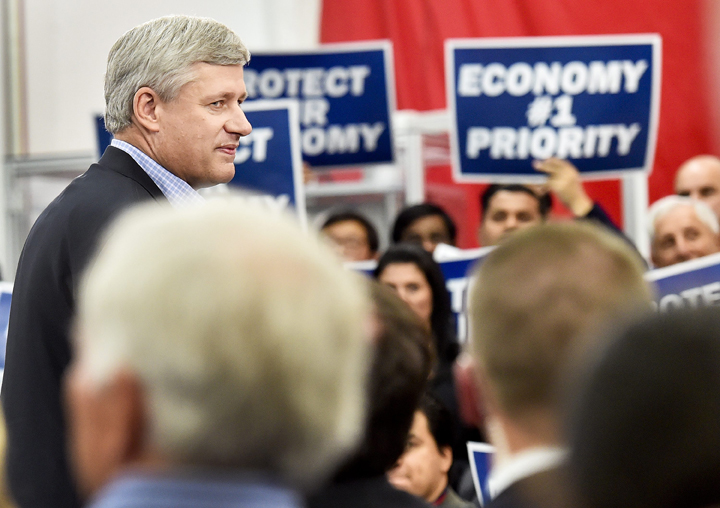When the writ was dropped and the election campaign started, the NDP was the frontrunner in the seat projections. Now, for the first time in the campaign, it trails both the Conservatives and the Liberals.

According to seat projections from the Laurier Institute for the Study of Public Opinion and Policy (LISPOP), the Conservatives are projected to win 123 seats based on its aggregation of polls conducted between Sept. 28 and Oct. 4. The Liberals are 10 seats behind with 113 seats. The NDP has fallen well behind with just 98 seats.
The NDP lost eight seats since Sept. 29 and 19 since Sept. 22. Most of its losses have come in Quebec where the party is projected to win eight fewer seats than last week.
Much of the NDP’s decline has been a result of the niqab debate, with Mulcair’s position pushing Quebec voters towards either the Conservatives or the Bloc Quebecois – which is projected to win three seats, two more than last week.
“In the last two weeks the NDP has dropped in popular vote support in Quebec from 43 per cent to 32 per cent, that’s 11 points, that’s big,” Kay said. “Some of it’s going to the Liberals, but frankly more is going to the Conservatives, and more of it to the Bloc.”
Popular support for the NDP has dropped 11 percentage points, while it’s increased six for the Bloc Quebecois and 5.5 points for the Tories. The Liberals, however, haven’t enjoyed nearly the same benefit as the Conservatives or Bloc as a result of the faltering NDP. In fact, popular support for the Liberals in Quebec has moved between 20 and 22 per cent over the last few weeks, he said.
“The Quebec liberal support isn’t changing much,” he said. “All of it’s going to either the Bloc or the Conservatives.”
While the Conservatives could end up winning the election, they are still well off the magic number of 170 seats needed for a majority. For the Tories to win a majority, Kay said, they’d have to break through in urban areas like Vancouver, Toronto, and Winnipeg as well as pick up a number of seats in Quebec.
“The one prediction I’ve never wavered from is it’s going to be a minority government,” Kay said.
He added that if it is a Conservative minority, it will likely be short-lived as both the Liberals and the NDP have pledged to not support Harper.
What’s happening across Canada?
- Alberta to overhaul municipal rules to include sweeping new powers, municipal political parties
- Norad looking to NATO to help detect threats over the Arctic, chief says
- Grocery code: How Ottawa has tried to get Loblaw, Walmart on board
- Canada, U.S., U.K. lay additional sanctions on Iran over attack on Israel
Tories, Liberals split Ontario
Regionally, the NDP has fallen well behind in Ontario, projected to pick up only 18 seats in the country’s most vote-rich region. The Liberals win the province with 53 seats, but that’s just three more than the Conservatives who generally win Ontario’s abundant rural ridings.
But there are a number of close seats in the GTA which, at the moment, are too close to call. At the moment, ridings like Brampton Centre, Brampton North, Brampton East, Vaughan, and Oakville are tagged “too close to call” by Lispop. (Lispop considers any riding where the difference between first and second place in the polls is less than five per cent to be too close to call.)
GTA ridings like Aurora-Oak Ridges-Richmond Hill, Oshawa, and Oakville North-Burlington are among the few areas surrounding Toronto that are leaning Conservative (between five and ten per cent margins in the polls).
Tories dominate Alberta, win Prairies
The Tories dominate Alberta, and are projected to win 29 of the province’s 34 seats, according to Lispop. The Liberals and Conservatives are projected to win three and two seats, respectively.
The Conservatives also have a slight lead in the Prairies and Norrthern Canada winning 15 seats. The NDP is projected to win nine, two more than the Liberals’ seven.
NDP dominates Quebec but is faltering
The NDP’s base of support is in Quebec and despite stumbling since the niqab debate became an election issue, they’re still projected to win 48 seats — the majority of the province’s 78 ridings.
The Liberals could win 15 and the Tories could win 12. The Bloc Quebecois has seen a resurgence of sorts thanks to the NDP’s stumbles, and could win three seats.
Battleground British Columbia
British Columbia remains, as it has been through most of the campaign, a tight race. The NDP has a slight lead over the other parties, with Lispop projecting Mulcair’s party could win 17 seats. The Conservatives are projected to win 13, while the Liberals are projected to win 11. The Green Party could win one.






Comments